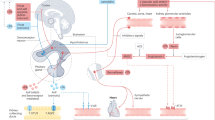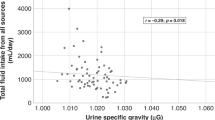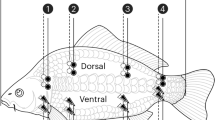Abstract
How much water we really need depends on water functions and the mechanisms of daily water balance regulation. The aim of this review is to describe the physiology of water balance and consequently to highlight the new recommendations with regard to water requirements. Water has numerous roles in the human body. It acts as a building material; as a solvent, reaction medium and reactant; as a carrier for nutrients and waste products; in thermoregulation; and as a lubricant and shock absorber. The regulation of water balance is very precise, as a loss of 1% of body water is usually compensated within 24 h. Both water intake and water losses are controlled to reach water balance. Minute changes in plasma osmolarity are the main factors that trigger these homeostatic mechanisms. Healthy adults regulate water balance with precision, but young infants and elderly people are at greater risk of dehydration. Dehydration can affect consciousness and can induce speech incoherence, extremity weakness, hypotonia of ocular globes, orthostatic hypotension and tachycardia. Human water requirements are not based on a minimal intake because it might lead to a water deficit due to numerous factors that modify water needs (climate, physical activity, diet and so on). Water needs are based on experimentally derived intake levels that are expected to meet the nutritional adequacy of a healthy population. The regulation of water balance is essential for the maintenance of health and life. On an average, a sedentary adult should drink 1.5 l of water per day, as water is the only liquid nutrient that is really essential for body hydration.
This is a preview of subscription content, access via your institution
Access options
Subscribe to this journal
Receive 12 print issues and online access
$259.00 per year
only $21.58 per issue
Buy this article
- Purchase on Springer Link
- Instant access to full article PDF
Prices may be subject to local taxes which are calculated during checkout

Similar content being viewed by others
References
Armstrong LE (2005). Hydration assessment techniques. Nut Rev 63, S40–S54.
Armstrong LE, Soto JA, Hacker Jr FT, Casa DJ, Kavouras SA, Maresh CM (1998). Urinary indices during dehydration, exercise, and rehydration. Int J Sport Nutr 8, 345–355.
D’Anei KE, Constant F, Rosenberg IH (2006). Hydration and cognitive function in children. Nutr Rev 64, 457–464.
Dietary Reference Intakes (2006). The Essential Guide to Nutrients Requirements. Institute of Medicine of the National Academies: Washington DC, 543 pp.
EFSA (2008). Draft dietary reference values for water. Scientific Opinion of the Panel on Dietetic Products, Nutrition and Allergies, (agreed on 11 April 2008 for release for public consultation).
Ellis KJ, Wong WW (1998). Human hydrometry: comparison of multifrequency bioelectrical impedance with H20 and bromine dilution. J Appl Physiol 85, 1056–1062.
Francesconi RP, Hubbard RW, Szlyk PC, Schnakenberg D, Carlson D, Leva N et al. (1987). Urinary and hematologic indexes of hypohydration. J Appl Physiol 62, 1271–1276.
Ganong WF (2005). Review of Medical Physiology, 22nd edn, LANGE-Science: New York.
Gorelick MH, Shaw KN, Murphy KO (1997). Validity and reliability of clinical signs in the diagnosis of dehydration in children. Pediatrics 99, E6.
Grandjean AC, Campbell SM (2004). Hydration: Fluids for Life. A monograph by the North American Branch of the International Life Science Institute. ILSI North America: Washington DC.
Grandjean AC, Reimers CJ, Buyckx ME (2003). Hydration: issues for the 21st century. Nutr Rev 61, 261–271.
Gudivaka R, Schoeller DA, Kushner RF, Bolt MJG (1999). Single and multifrequency models for bioelectrical impedance analysis of body water compartments. J Appl Physiol 87, 1087–1096.
Häussinger D (1996). The role of cellular hydration in the regulation of cell function. Biochem J 313, 697–710.
Lang F, Waldegger S (1997). Regulating cell volume. Am Scientist 85, 456–463.
Lieberman HR (2007). Hydration and cognition: a critical review and recommendations for future research. J Am Coll Nutr 26 (Suppl 5), 555S–561S.
Manz F, Wentz A, Sichert-Hellert W (2002). The most essential nutrient: defining the adequate intake of water. J Pediatr 141, 587–592.
Mathie JR (2005). Second generation mixture theory equation for estimating intracellular water using bioimpedance spectroscopy. J Appl Physiol 99, 780–781.
Maughan RJ, Shirreffs SM, Watson P (2007). Exercise, heat, hydration, and the brain. J Am Coll Nutr 26 (Suppl 5), 604S–612S.
Mayo Clinic (2008): http://www.mayoclinic.com/health/dehydration/DS00561/DSECTION=symptoms.
Mentes JC, Wakefield B, Culp K (2006). Use of a urine color chart to monitor hydration status in nursing home residents. Biol Res Nurs 7, 197–203.
Montain SJ, Latzka WA, Sawka MN (1999). Fluid replacement recommendations for training in hot weather. Mil Med 164, 502–508.
Murray B (2007). Hydration and physical performance. J Am Coll Nutr 26 (Suppl 5), 542S–548S.
Oppliger RA, Magnes SA, Popowski LA, Gisolfi CV (2005). Accuracy of urine specific gravity and osmolality as indicators of hydration status. Int J Sport Nutr Exerc Metab 15, 236–251.
Phillips PA, Rolls BJ, Ledingham JG, Forsling ML, Morton JJ, Crowe MJ et al. (1984). Reduced thirst after water deprivation in healthy elderly men. N Engl J Med 311, 753–759.
Pialoux V, Mischler I, Mounier R, Gachon P, Ritz P, Coudert J et al. (2004). Effect of equilibrated hydration changes on total body water estimates by bioelectrical impedance analysis. Br J Nutr 91, 153–159.
Ritz P (2001). Bioelectrical impedance analysis estimation of water compartments in elderly diseased patients: the source study. J Gerontol 56, M344–M348.
Ritz P, Berrut G (2005). The importance of good hydration for day-to-day health. Nutr Rev 63, S6–S13.
Sawka MN (1992). Physiological consequences of hypohydration: exercise performance and thermoregulation. Med Sci Sports Exerc 24, 657–670.
Sawka MN, Cheuvront SN, Carter III R (2005). Human water needs. Nutr Rev 63, S30–S39.
Shirreffs SM (2003). Markers of hydration status. Eur J Clin Nutr 57 (Suppl 2), S6–S9.
Shirreffs SM (2005). The importance of good hydration for work and exercise performance. Nutr Rev 63, S14–S21.
Szinnai G, Schachinger H, Arnaud MJ, Linder L, Keller U (2005). Effect of water deprivation on cognitive-motor performance in healthy men and women. Am J Physiol Regul Integr Comp Physiol 289, R275–R280.
Thomas DR, Cote TR, Lawhorne L, Levenson SA, Rubestein LZ, Smith DA et al. (2008). Understanding clinical dehydration and its treatment. J Am Med Dir Assoc 9, 292–301.
Wang ZM, Deurenberg P, Wang W, Pietrobelli A, Baumgartner RN, Heymsfield SB (1999). Hydration of fat-free body mass: a review and critique of a classic body-composition constant. Am J Clin Nutr 69, 833–841.
Author information
Authors and Affiliations
Corresponding author
Rights and permissions
About this article
Cite this article
Jéquier, E., Constant, F. Water as an essential nutrient: the physiological basis of hydration. Eur J Clin Nutr 64, 115–123 (2010). https://doi.org/10.1038/ejcn.2009.111
Received:
Revised:
Accepted:
Published:
Issue Date:
DOI: https://doi.org/10.1038/ejcn.2009.111
Keywords
This article is cited by
-
Enteric bacterial agents associated with diarrhea and their antimicrobial sensitivity profiles in children under 5 years from mukuru informal settlement, Nairobi, Kenya
BMC Infectious Diseases (2024)
-
Multinational Association of Supportive Care in Cancer (MASCC) expert opinion/guidance on the use of clinically assisted hydration in patients with advanced cancer
Supportive Care in Cancer (2024)
-
Busy on campus: activity budget, feeding habit and habitat use by the Gambian sun squirrel Heliosciurus gambianus on the University of Ghana, Legon campus
Urban Ecosystems (2024)
-
Hydrogeochemical analysis and groundwater quality assessment of Ughelli South, Southern Nigeria
Environmental Monitoring and Assessment (2023)
-
Vanishing Water: Rescuing the Neglected Food Resource
Food Engineering Reviews (2023)



